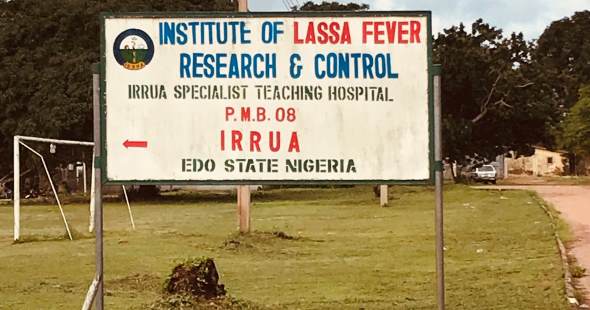Diagnostic capacity to combat Lassa fever

What is this project?
This project aims to improve the response to annual Lassa fever outbreaks in Nigeria through the development of new diagnostics and laboratory strengthening initiatives.
Why are we working on it?
Lassa fever is a viral disease, endemic in many West African countries including Nigeria, and annual outbreaks are commonplace. Every year, thousands of potential cases are reported to the Nigeria Centre for Disease Control (NCDC), of which several hundred are confirmed positive.
Despite the predictability of these outbreaks, few regulatory-approved diagnostics – and no vaccines or medicines – are available to test or treat patients. Hospital laboratories in Nigeria and other affected countries have limited capacity to implement complex, research-grade diagnostics. The Nigerian government has formally requested assistance from WHO to address the diagnostic gap and strengthen their ability to respond to the next Lassa fever outbreak.
What does it involve?
Together with WHO and NCDC, we are working on a response plan for Nigeria that will deliver three core elements:
- WHO-approved diagnostics available for Lassa fever testing in affected countries. This includes supporting the formal review of newly available diagnostics through a WHO Expert Review Panel for Diagnostics (ERPD) mechanism and conducting external performance studies to inform assays for use in public health studies
- Strengthened laboratory capacity for outbreak detection and response, as well as clinical trial capacity for the rapid evaluation of new diagnostics for outbreak pathogens. This includes partnership building with in-country laboratories, site evaluations, procurement of equipment and reagents, and joint trainings on general laboratory operations and biosafety, diagnostic testing, and good clinical/laboratory practices
- Well-curated sample archives for diagnostic R&D, as well as for therapeutics and vaccines. This also includes partnership building, site evaluations, procurement of equipment and reagents, and joint trainings on laboratory operations and biosafety, diagnostic testing, sample archiving, and good clinical/laboratory practices.
What do we expect to achieve?
This project will deliver urgently needed new Lassa fever diagnostics, as well as strengthening Nigeria’s ability to respond to and contain future Lassa fever outbreaks. Developing clinical trial excellence in key sites will also support future R&D endeavours in the country.
Beyond Lassa fever, system strengthening will enable effective surveillance and diagnostic readiness for outbreaks of other pathogens.
What is the timescale?
These activities are expected to run for 3 years, between 2019 and 2021.
Partners and funding
We are working closely with WHO Nigeria, the Nigeria Centre for Disease Control (NCDC), industry partners, and academic researchers such as the Bernhard Nocht Institute for Tropical Medicine (BNITM).
This project is supported by funding from the Coalition for Epidemic Preparedness Innovations (CEPI), the German Federal Ministry for Education and Research (BMBF) and KfW.
More information
For more information please contact us.
Quick links

